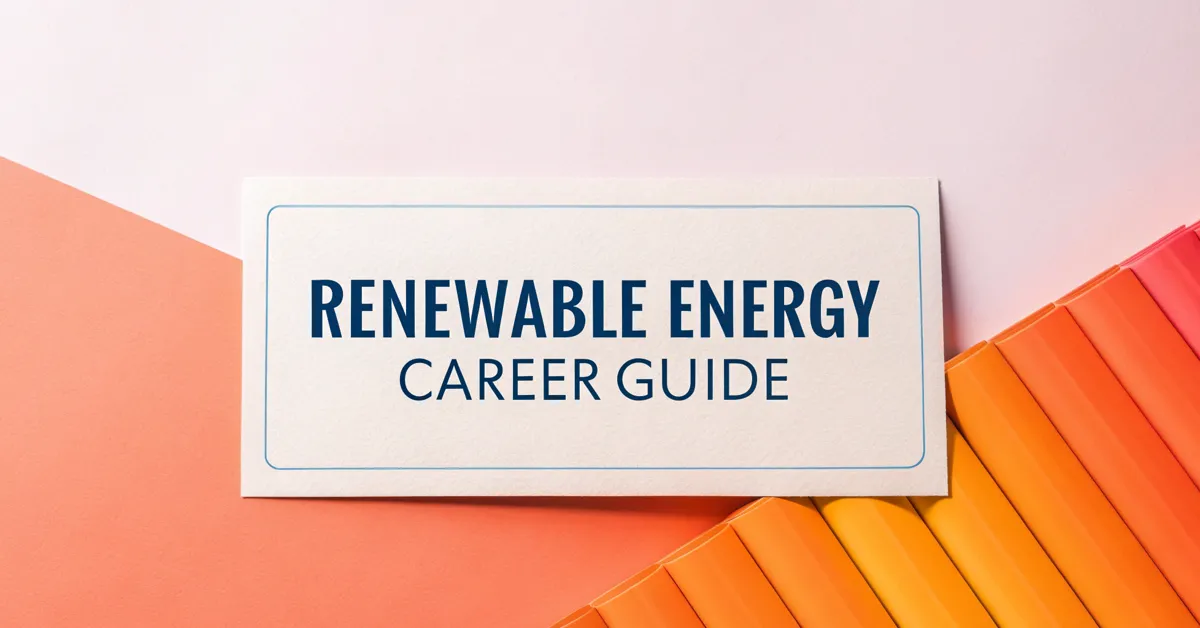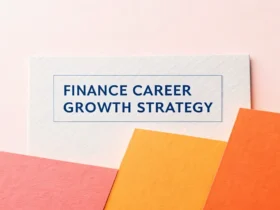The shift toward sustainability isn’t a fleeting trend; it’s a fundamental change reshaping industries across the globe. For engineers, this evolution presents a wealth of opportunity to combine technical expertise with a passion for environmental stewardship. The clean energy sector is booming, and the need for skilled professionals to design, build, and maintain renewable energy systems has never been greater. Are you an engineer looking to make a tangible impact on the planet?
This career guide explores the landscape of clean energy, offering insights into the diverse roles available, the skills needed to excel, and the steps you can take to launch or transition into this dynamic field. Your skills can help forge a cleaner, more sustainable future.
Renewable Energy Career Guide
Understanding the Clean Energy Landscape
The clean energy sector encompasses a wide array of technologies and industries, all focused on reducing reliance on fossil fuels and mitigating climate change. Grasping the scope of this field is crucial for identifying your niche and charting your career path.
Clean energy is not a monolith. It includes a wide range of technologies:
- Solar Power: Harnessing the sun’s energy through photovoltaic (PV) cells and concentrated solar power (CSP) systems.
- Wind Power: Converting wind energy into electricity using wind turbines.
- Hydropower: Generating electricity from the flow of water, including large dams and small-scale hydro projects.
- Geothermal Energy: Tapping into the Earth’s internal heat for electricity generation and direct heating applications.
- Biomass Energy: Utilizing organic matter, such as wood, crops, and waste, to produce heat, electricity, and biofuels.
- Energy Storage: Developing technologies like batteries, pumped hydro, and compressed air energy storage to improve the reliability and stability of renewable energy sources.
- Energy Efficiency: Improving the energy efficiency of buildings, transportation, and industrial processes.
- Carbon Capture and Storage (CCS): Capturing carbon dioxide emissions from industrial sources and storing them underground to prevent them from entering the atmosphere.
- Nuclear Power: Nuclear energy is not strictly renewable, it is often considered a clean energy source due to its low carbon emissions.
The common thread is a drive to lower carbon emissions. The International Energy Agency (IEA) reports that renewable energy sources accounted for almost 30% of global electricity generation in 2021, and this number is projected to rise significantly in the coming decades.
The clean energy sector spans across many fields:
- Research and Development: Inventing novel clean energy technologies.
- Manufacturing: Producing components for renewable energy systems.
- Construction and Installation: Building and setting up renewable energy facilities.
- Operations and Maintenance: Keeping renewable energy systems running smoothly.
- Consulting: Giving expert advice on clean energy projects.
- Policy and Regulation: Creating rules for the clean energy sector.
- Finance: Funding clean energy projects.
Engineers are vital in every stage of this process.
In-Demand Clean Energy Engineering Roles
The demand for engineers in the clean energy sector is growing rapidly. Many roles require specific skills and expertise. Here are some of the most sought-after positions:
- Renewable Energy Engineer: These engineers design, develop, and test renewable energy systems, such as solar, wind, and geothermal. They analyze energy needs, assess site suitability, and optimize system performance.
- Electrical Engineer: Electrical engineers are crucial for connecting renewable energy sources to the grid, designing power electronics, and ensuring the reliable transmission and distribution of electricity.
- Mechanical Engineer: Mechanical engineers design and improve the mechanical components of renewable energy systems, such as wind turbine blades, solar thermal collectors, and geothermal heat exchangers.
- Civil Engineer: Civil engineers are responsible for the planning, design, and construction of renewable energy facilities, including solar farms, wind farms, and hydropower plants.
- Environmental Engineer: Environmental engineers assess the environmental impact of renewable energy projects, develop mitigation strategies, and ensure compliance with environmental regulations.
- Chemical Engineer: Chemical engineers play a role in the development of biofuels, hydrogen production, and carbon capture and storage technologies.
- Energy Storage Engineer: These engineers specialize in the design, development, and deployment of energy storage systems, such as batteries, pumped hydro, and compressed air energy storage.
- Grid Integration Engineer: Grid integration engineers work to integrate renewable energy sources into the existing electricity grid, ensuring stability, reliability, and efficient power flow.
- Sustainability Engineer: Sustainability engineers focus on optimizing energy efficiency, reducing waste, and promoting sustainable practices in various industries.
- Project Manager: Project managers oversee the planning, execution, and completion of clean energy projects, ensuring they are on time, within budget, and meet performance targets.
The US Bureau of Labor Statistics projects very good job prospects for engineers in fields related to energy and sustainability. For instance, employment of environmental engineers is projected to grow 4% from 2022 to 2032.
Essential Skills for a Clean Energy Career
To thrive in the clean energy sector, engineers need a combination of technical skills, soft skills, and industry-specific knowledge. Building on your engineering foundation, consider honing the following:
-
Technical Skills:
- Renewable Energy Technologies: A solid grasp of the principles and applications of various renewable energy technologies, including solar, wind, hydro, geothermal, and biomass.
- Energy System Modeling and Analysis: Ability to use software tools and techniques to simulate and analyze the performance of energy systems, optimize energy consumption, and assess the economic viability of renewable energy projects.
- Power Systems Engineering: Knowledge of electrical power systems, grid integration, and power electronics to ensure the reliable and efficient transmission and distribution of renewable energy.
- Thermodynamics and Heat Transfer: Understanding of thermodynamic principles and heat transfer processes for designing and optimizing solar thermal collectors, geothermal heat exchangers, and other thermal energy systems.
- Fluid Mechanics: Proficiency in fluid mechanics for designing and optimizing wind turbine blades, hydropower turbines, and other fluid-based energy systems.
- Materials Science: Knowledge of materials science for selecting appropriate materials for renewable energy systems, considering factors like durability, corrosion resistance, and cost-effectiveness.
- Data Analysis and Statistics: Ability to collect, analyze, and interpret data to assess the performance of renewable energy systems, identify trends, and make informed decisions.
- CAD Software: Proficiency in computer-aided design (CAD) software for creating detailed designs and models of renewable energy systems.
- Programming: Familiarity with programming languages like Python, MATLAB, and LabVIEW for data analysis, modeling, and control system development.
-
Soft Skills:
- Problem-Solving: Ability to identify and solve technical challenges in renewable energy projects, using analytical and creative thinking.
- Communication: Ability to effectively communicate technical information to both technical and non-technical audiences, including clients, colleagues, and the public.
- Teamwork: Ability to work collaboratively in multidisciplinary teams, contributing to project goals and fostering a positive team environment.
- Project Management: Ability to manage projects effectively, including planning, scheduling, budgeting, and risk assessment.
- Critical Thinking: Ability to evaluate information objectively, identify biases, and make informed judgments about the feasibility and effectiveness of renewable energy solutions.
- Adaptability: Ability to adapt to changing technologies, regulations, and market conditions in the rapidly evolving clean energy sector.
-
Industry-Specific Knowledge:
- Energy Policy and Regulations: Awareness of government policies, incentives, and regulations related to renewable energy, including tax credits, subsidies, and renewable portfolio standards.
- Sustainability Principles: Understanding of sustainability principles and their application to renewable energy projects, considering environmental, social, and economic factors.
- Lifecycle Assessment: Ability to assess the environmental impact of renewable energy systems throughout their entire lifecycle, from manufacturing to disposal.
- Energy Markets: Knowledge of energy markets, including electricity pricing, supply and demand dynamics, and the role of renewable energy in the overall energy mix.
- Carbon Accounting: Understanding of carbon accounting principles and methodologies for quantifying and reporting greenhouse gas emissions reductions from renewable energy projects.
The Global Energy Talent Index consistently highlights technical proficiency and project management as critical skills for success in the renewable energy sector.
Education and Training Pathways
Engineers interested in a clean energy career have several education and training options to consider:
-
Bachelor’s Degree: A bachelor’s degree in engineering (e.g., electrical, mechanical, civil, environmental) is the foundational step. During your undergraduate studies, focus on courses related to energy systems, thermodynamics, fluid mechanics, and electrical power.
-
Master’s Degree: A master’s degree in renewable energy, sustainable energy, or a related field can provide more specialized knowledge and skills. These programs often cover topics such as renewable energy technologies, energy policy, and energy economics.
-
Certifications: Industry certifications can demonstrate your expertise and commitment to the field. Some popular certifications include:
- Certified Energy Manager (CEM): Offered by the Association of Energy Engineers (AEE), this certification validates your knowledge of energy management principles and practices.
- LEED Accreditation: Offered by the US Green Building Council (USGBC), this accreditation demonstrates your expertise in green building design, construction, and operation.
- NABCEP Certification: Offered by the North American Board of Certified Energy Practitioners (NABCEP), this certification validates your knowledge and skills in solar photovoltaic (PV) system installation and design.
-
Continuing Education: The clean energy sector is constantly evolving, so staying up-to-date with the latest technologies and trends is essential. Consider attending conferences, workshops, and online courses to expand your knowledge and skills.
-
Internships: Internships provide valuable hands-on experience in the clean energy sector. Look for internships with renewable energy companies, research institutions, and government agencies.
Many universities now offer specialized renewable energy engineering programs. A master’s degree can make you more competitive.
Building Your Network and Finding Opportunities
Networking is crucial for landing a job in the clean energy sector. Get yourself out there!
- Attend Industry Events: Attend renewable energy conferences, workshops, and trade shows to network with industry professionals, learn about the latest trends, and explore job opportunities.
- Join Professional Organizations: Join organizations like the AEE, the American Solar Energy Society (ASES), and the Wind Energy Foundation to connect with other engineers and access valuable resources.
- Online Platforms: Use online platforms like LinkedIn, Indeed, and Glassdoor to search for job openings and connect with recruiters and hiring managers.
- Informational Interviews: Reach out to engineers working in the clean energy sector and ask for informational interviews. This is a great way to learn about different career paths, gain insights into the industry, and expand your network.
- Career Fairs: Attend career fairs at universities and colleges to meet with recruiters from renewable energy companies.
- Online Communities: Join online communities and forums related to renewable energy to participate in discussions, share your expertise, and connect with other professionals.
The Department of Energy’s website has resources for finding internships and entry-level jobs. Also, remember that networking with people in the industry can open doors.
Navigating the Job Search
Finding a job in clean energy is similar to finding one in any other field, but with a focus on the unique skills and experience we’ve discussed.
- Tailor Your Resume: Customize your resume to highlight your skills and experience related to renewable energy. Emphasize your technical skills, project management experience, and knowledge of energy policy and regulations.
- Highlight Relevant Projects: Include details about any renewable energy projects you have worked on, whether in school, internships, or previous jobs. Describe your role, the technologies involved, and the outcomes achieved.
- Craft a Compelling Cover Letter: Write a cover letter that clearly articulates your passion for clean energy, your skills and experience, and your interest in the specific position and company.
- Prepare for Technical Interviews: Be prepared to answer technical questions related to renewable energy technologies, energy system modeling, and power systems engineering. Practice problem-solving and be ready to discuss your approach to technical challenges.
- Research Companies Thoroughly: Before interviews, research the companies you are applying to. Understand their mission, values, products, and services. Be prepared to discuss how your skills and experience align with their goals.
- Showcase Your Passion: Employers in the clean energy sector are often looking for candidates who are passionate about sustainability and making a positive impact on the environment. Be sure to convey your enthusiasm and commitment during the interview process.
Many companies value practical experience. Be sure to highlight any hands-on projects or internships.
Salary Expectations in the Clean Energy Sector
Salaries in the clean energy sector vary depending on the role, experience level, education, and location. Here are some general salary ranges for common clean energy engineering positions in the United States:
- Renewable Energy Engineer: \$70,000 – \$120,000 per year
- Electrical Engineer: \$75,000 – \$130,000 per year
- Mechanical Engineer: \$70,000 – \$120,000 per year
- Civil Engineer: \$65,000 – \$110,000 per year
- Environmental Engineer: \$60,000 – \$100,000 per year
- Energy Storage Engineer: \$80,000 – \$140,000 per year
- Grid Integration Engineer: \$85,000 – \$150,000 per year
- Sustainability Engineer: \$65,000 – \$110,000 per year
- Project Manager: \$80,000 – \$150,000 per year
These are just estimates, and actual salaries may vary. Location and experience have a huge impact.
Staying Ahead of the Curve
The clean energy sector is dynamic. Staying informed is vital for a long career.
- Follow Industry News and Trends: Stay up-to-date with the latest developments in renewable energy technologies, energy policy, and energy markets by reading industry publications, following influential bloggers and thought leaders, and attending webinars and conferences.
- Join Professional Associations: Join professional associations like the AEE, the ASES, and the Wind Energy Foundation to access valuable resources, network with other engineers, and participate in continuing education programs.
- Engage in Online Communities: Participate in online communities and forums related to renewable energy to share your expertise, ask questions, and learn from others.
- Pursue Advanced Education: Consider pursuing a master’s degree or a Ph.D. in renewable energy or a related field to deepen your knowledge and skills and stay ahead of the curve.
- Get Involved in Research: Get involved in research projects related to renewable energy to contribute to the advancement of clean energy technologies.
- Seek Mentorship: Seek mentorship from experienced engineers in the clean energy sector to gain valuable insights, guidance, and support.
The IEA and the National Renewable Energy Laboratory (NREL) are great sources for industry reports and forecasts. Staying informed about current events is equally vital.
Can Clean Energy Work For You?
A career in clean energy offers engineers the chance to use their skills for a greater purpose: building a sustainable future. It demands dedication, continuous learning, and a passion for environmental stewardship. But the rewards – a fulfilling career and a tangible impact on the world – are well worth the effort.















Leave a Reply
View Comments